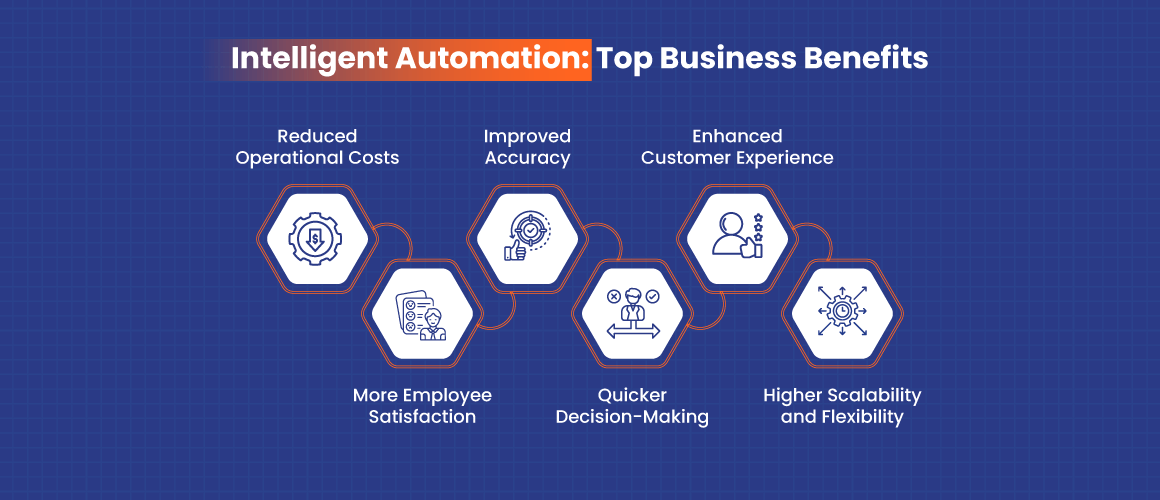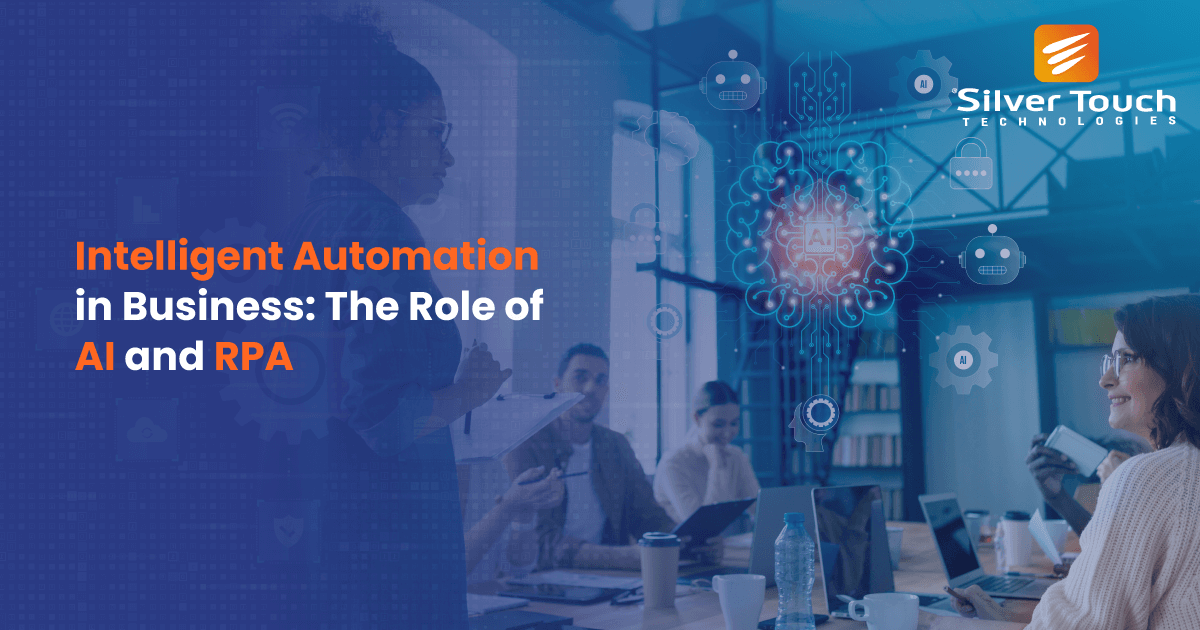Challenges and competition are two core components of the modern business landscape. It requires efficiency, innovation, and insightful decision-making to thrive in such a complex scenario. Automation has emerged as a transformative trend for streamlining repetitive actions. However, for complex and dynamic environments, intelligent automation becomes inevitable.
RPA and artificial intelligence (AI) combine to bring the concept of Intelligent Automation (IA). As a game-changer concept, IA can offer the benefits of the structured efficiency of RPA and the intelligent adaptability of AI. It goes beyond traditional automation and remains more efficient. In this post, we will dig deep into the role of intelligent automation and useful considerations.
Let’s start with a basic understanding of RPA and AI technologies.
Key Components of RPA and AI
Robotic Process Automation, as the name suggests, involves the usage of software bots for automating repetitive, rule-based processes. These bots can interact with existing applications and systems for generating reports, processing invoices, and entering data, etc. Predefined rules and structured inputs can make RPA highly effective for accelerating routine processes.
Artificial Intelligence, or AI, focuses on enabling computers or machines to perform tasks that need human intelligence. In other words, AI mimics human intelligence through ML (Machine Learning), and NLP (Natural Language Processing). Computer Vision is also a revolutionary component of AI that enables machines to ‘see’ and interpret images.
Intelligent automation is a result of AI and RPA integration. It surpasses the limitations of RPA by handling unstructured data and making intelligent decisions based on context.
Intelligent Automation- How AI and RPA Combination Transforms Processes
The combination of AI and RPA can give the advantage of intelligent process automation (IPA) to modern enterprises. This combination moves beyond simple task automation by creating intelligent and adaptive workflows across different industry sectors.
For example, IA makes the invoice process intelligent by using AI to extract data from various formats and RPA to automate data entry. This is particularly beneficial in the BFSI and retail sectors to detect potential fraud and anomalies in transactions.
Intelligent automation can also revolutionize customer services by integrating AI-powered chatbots with RPA. These chatbots can understand and respond to customer queries on a 24×7 basis. Supply chain management can leverage the benefit of IA through predictive demand forecasting powered by AI.
Intelligent logistics is useful for route optimization and real-time tracking of shipments. Here, AI-powered RPA can automate dispatch and delivery confirmations for more efficient and cost-effective logistics solutions. AI can organize and analyze various reports, whereas RPA can increase the speed.
Simply put, AI and RPA integration is a game-changer for businesses. Let’s go through the key business benefits of IA.
Top Business Benefits of Intelligent Automation

Effective implementation of intelligent automation can offer several quantifiable benefits, including-
Reduced Operational Costs
Automation of complex processes can reduce labor costs and minimize errors that lead to rework. Companies can optimize resources to save more bucks.
Improved Accuracy
Intelligent automation can minimize the risk of human errors by handling complex processes more accurately.
Enhanced Customer Experience
Quicker processing times, personalized interaction, and 24×7 services based on AI chatbots can improve customer experiences.
More Employee Satisfaction
Automation of mundane, repetitive, and even a bit complicated tasks can free up more employees to focus on other productive activities.
Quicker Decision-Making
Real-time data analysis and insights from AI-driven business automation can enhance the decision-making process.
Higher Scalability and Flexibility
Intelligent automation solutions bring more scalability and flexibility to meet ever-changing requirements more effectively.
Altogether, IA can increase the efficiency and productivity of the company irrespective of its size and industry sector. However, it is essential to address several implementation challenges to leverage the benefits of intelligent automation.
Major Challenges and Considerations for Effective IA Implementation
Effective IA implementation is a complex yet imperative task for any company. Here are the key challenges and considerations to leverage the benefits of successful IA implementation.
Implementation Challenges
Initial Upfront Investment
The implementation of IA needs significant upfront expenditure on software licenses for RPA and AI tools. Infrastructure upgrades and other costs can increase the budget. However, this investment will give good returns in a short period with increased efficiency.
Integration with Existing Systems
Legacy business systems may not support highly advanced IA solutions. In such a scenario, organizations need to plan carefully and opt for custom development. A reputed RPA development partner can assist your company to get the most suitable solution with robust functionality.
Need for a Skilled Workforce
Ongoing maintenance and real-time assistance while using AI-powered RPA needs a skilled workforce. Moreover, it is necessary to hire people who can analyze the processes for automation opportunities and train your staff. Comprehensive training programs are useful for the technical teams.
Change Management
The introduction of RPA and IA brings significant alterations to existing workflows. As job roles may get changed, companies face resistance from employees. Effective change management strategies with proper training and involvement of employees is necessary to address this issue.
Major Considerations
Talking about considerations, IA systems deal with large volumes of sensitive data frequently. It makes an implementation of robust security measures a top priority. Companies need to ensure strict compliance with data protection regulations and internal policies.
Moreover, AI components in the IA need to address ethical implications related to biases in algorithms, transparency, and decision-making processes. Along with these considerations, it is better to analyze the potential effects of IA on employment while establishing responsible AI governance.
Concluding Remarks
Intelligent automation offers quantifiable benefits like reduced operational costs and enhanced customer experience. It goes beyond traditional RPA-driven automation. However, companies should find a reputed RPA solution provider to address implementation challenges and leverage the benefits of AI-driven business automation.
Silver Touch Technologies is a trusted technology partner for combining RPA and artificial intelligence. We offer end-to-end services to enable your company to get AI-driven business automation. Our robust and custom RPA solutions can take your company to a new level by offering a competitive edge and driving growth. Contact us to learn more about the scope of an AI-powered RPA.



